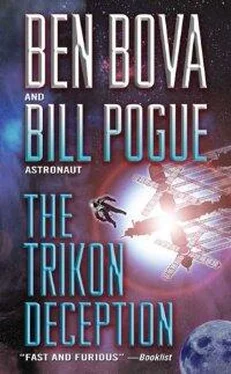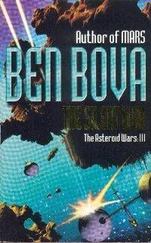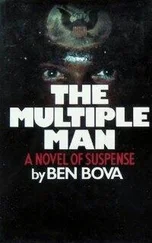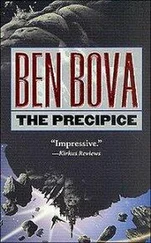It was a face built of contradictions: finely sculpted cheekbones and a hawk’s nose that had been broken long ago when he had crash-landed a crippled jet fighter. Strong stubborn jaw with a mouth that seemed almost too small for it, lips as thin and sensitive as a poet’s. He kept his dark brown hair short enough to meet the old military regulations, but combed it forward to conceal his receding hairline. The gray at his temples bothered him, even though women called it distinguished.
And the eyes: electric blue, vital, brilliant. The eyes of an eagle, a flier, probing incessantly, never still, never satisfied. But now they were wary, guarded, the eyes of a man who had been defeated and banished. The eyes of a man who wanted to be alone in the cockpit of a nimble supersonic jet, but found himself smothered in the responsibilities of commanding a glorified schoolhouse that plodded along a fixed and calculated orbit—and in danger of losing even that.
A small bonsai bush trimmed into the shape of a bird floated at the end of a tether attached to the wall of his cramped office. Tighe whispered to it, “Sorry, no time for you this morning,” and gently pushed it out of his way as he searched through the Velcro-lined shelves of the narrow cabinet.
At last he found what he was looking for: the blood-pressure cuff. With a grunt of satisfaction he rolled up the left sleeve of his coveralls and wrapped the plastic around his biceps. Taking a deep breath that was supposed to calm him, he inflated the cuff and then read off the glowing digital numbers on its tiny electronic display: 163 over 101. The readout was adjusted for the effects of microgravity. Not bad, he thought. But not good enough.
The command module was the smallest of all the sections that made up the Trikon space station, and the most densely packed. While the laboratory and habitat modules were each fifteen meters long, the command module’s cylinder was half that length. It was jammed with computer systems that tracked everything and everyone aboard the station, communications gear that kept Tighe and his crew in constant touch with Earth, and a command and control center that maintained the station’s life-support systems and external equipment. Dan’s office and the infirmary were wedged into opposite ends of the cramped module. Next to the cubbyhole infirmary was the sick bay: three sleep restraints fastened against the only bare spot on any of the walls .As if to compensate for the crowding, it was the only module with a view: a trio of small flused-silica viewing ports were built into the bulkhead at the command and control station.
Tighe anchored his slippered feet in the loops at the base of the chest-high desk that held his personal computer and tapped out the instructions that patched it into the station’s communications network. He plugged in the headset and clamped it on, adjusting the pin-sized microphone in front of his mouth. Make it fast, he told himself. Give yourself a few minutes to trim the bonsai and relax before you let her take your blood pressure.
The daily transmission from Earth began precisely on time.
“Houston to Trikon Station,” scratched a voice. The display screen unscrambled to reveal the bullet head of Tom Henderson, ceiling lights gleaming on his bald dome.
“This is Trikon. I read you, Houston,” replied Tighe.
“Hello, Dan. How you doin’, boy? You look redder’n a beet.”
“I ran out of razor blades and had to use the wind-up. Beats the hell out of your face.”
“Looks like you’ll have to make do without blades for a few days more. Hurricane Caroline is stalled in the Atlantic, so the shuttle’s being delayed.”
“How long?”
“Three days, maybe five. Depends on when Caroline clears out.”
“Christ,” said Tighe. “I have a frazzled crew, a bunch of immature scientists, and now this.”
“Can’t do anything about Mother Nature,” said Henderson. “And you forgot the Martians.”
“I’m trying to forget about them.”
The two men ran through their daily housekeeping chores—analyzing the amount of food, water, air, and fuel remaining on board, plotting the orbital path, coordinating the photographs that would be taken by the camera array on the station’s nadir platform. Meteorologists were especially anxious to get all the photos of Caroline that they could provide. One task originally scheduled for today’s communication—fixing the rendezvous with the shuttle-would have to wait.
“One more thing,” said Henderson. “Trikon has added another scientist to the next rotation. His name is Hugh O’Donnell. American biochemist. I don’t have his file yet, but I see that he has standing orders to report to your medical officer on a daily basis.”
“Health risk?”
“Looks it.” Henderson arched his eyebrows. “I’ll shoot you his file as soon as I receive it.”
“Keep me posted on the shuttle.”
“Roger that,” said Henderson. “Out,”
Tighe removed the headset and clipped it to its receptacle on the wall. It was important to fasten down everything in microgravity. Otherwise they somehow floated away, lost until they turned up stuck to an intake ventilator grid. Tighe remembered waking up in the middle of the night on his first shuttle flight to find a green snake gliding toward him. It took him a couple of panicked heartbeats to realize that it was the garden hose that one of the mission specialists had brought aboard for a botany experiment. The jerk hadn’t tied it down properly and it was undulating like a cobra across the mid-deck section where the crew slept.
Then he remembered his last shuttle flight, and felt his pulse quickening with anger. The bonsai bird hovered near his shoulder. He nuzzled its beak. Calm me down, pal, he said to the green bird. Calm me down before they throw me out of this job, too.
Somebody rapped on the bulkhead. Before Tighe could answer, the accordion door squealed back and Dave Nutt pushed through. He was gasping for air. His T-shirt had come untucked from his nylon pants and rode up over his paunchy stomach.
“What’s wrong, Dave?” Tighe liked Nutt; otherwise he would have snapped at him for barging into his office. Nutt was dedicated and sober, not at all like the other cases of arrested development Trikon called scientists. But now he was wild-eyed, panting, his hair and beard beaded with perspiration.
“My computer!” heaved Nutt. “Someone’s tampered with it!”
“What? How?”
“Downloaded my research files.”
The scientists were always complaining to Tighe about people tampering with their work. Although the corporations that made up the Trikon consortium were supposed to be working cooperatively, industrial espionage seemed to be the major industry aboard the station. Most of the accusations were false alarms bred by overactive imaginations or personal animosities among the scientists. Or at least they could not be proved to Tighe’s satisfaction.
“How do you know?” Tighe asked.
“I have a subprogram that logs every use. Somebody went into our module at two a.m. and downloaded my goddamned files!”
“I’d better take a look,” said Tighe, mentally postponing his date with the doctor.
Stu Roberts was still in The Bakery when Tighe and Nutt arrived. Now that Nutt had taken the extreme step of actively involving the station commander, Roberts decided to lie low and let the scientist embarrass himself. He hovered on the edge of audibility as Nutt gave Tighe a fevered explanation of the messages appearing on the computer monitor.
Tighe had only a general idea of the work being conducted in the three Trikon laboratory modules. He knew that the project involved microbial genetics: the scientists were trying to engineer a bug that would eat pollutants or toxic wastes or something like that. His interest in the bug was purely practical. As station commander, he constantly worried about containment of all the potentially toxic agents used by the scientists in their research. Accidental release of bacteria, caustic chemicals, or pollutants could wreak havoc in the delicately controlled environment of the station. In space you cannot open a window for fresh air. One mistake with chemical or biological materials could kill everyone aboard very swiftly.
Читать дальше












